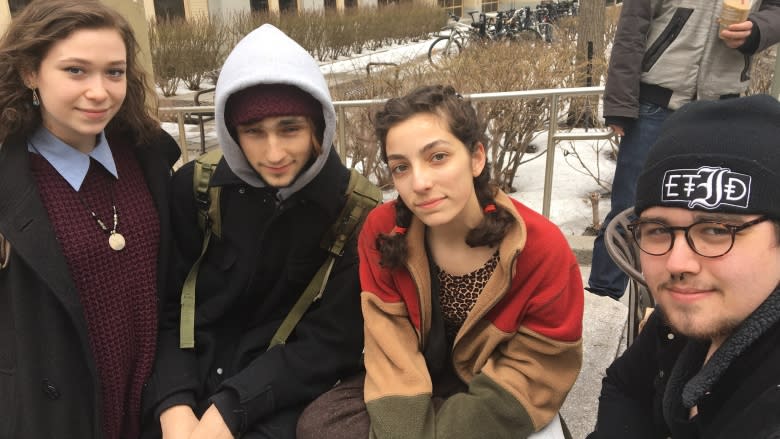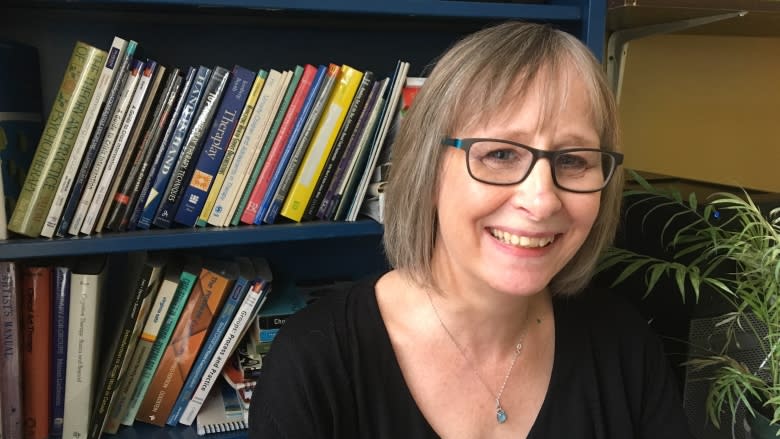Teach teens the warning signs of dating violence early, students say
Teaching teens about intimate partner violence, especially the warning signs, must happen much earlier than the end of high school, say several students at Dawson College.
Many young adults on the campus are saddened by the death of Daphné Huard-Boudreault, 18, who was killed last week when she returned to the apartment she had shared with her ex-boyfriend.
Her ex-boyfriend, Anthony Pratte-Lops, has been charged with first-degree murder.
'People tend to romanticize jealousy'
Kyra Paquet, also 18, a cinema and communications student, says she's learning a lot about toxic relationships at Dawson College.
"I'm taking a really cool class ... about gender issues in literature and we're talking a lot about the cycle of violence," she said.
But she says this information would have been helpful at a much younger age.
"I think people tend to romanticize jealousy in a way that can lead people to think that their toxic relationship is a normal thing," she said.
In high school, Paquet says the topic of relationships only came up in her final year, Secondary 5 when most students are 16 or 17 years old.
"I would have liked to learn about this as early as Secondary 2, maybe Secondary 1," she said, when students are around 12 to 14 years of age.
"You're exposed to relationships at a very young age so I think probably the second you're exposed to it, or start noticing it, is the time you should realize what is a good relationship and what is a bad relationship," she said.
'I knew I was being controlled'
Another 18-year-old Dawson College student, agreed to share her experience with a controlling boyfriend on the condition that CBC protect her identity. She left the relationship but fears her ex-boyfriend's reaction to her comments.
She says they were a couple at the same high school and he had a long list of rules.
"Not wearing shorts not wearing leggings because it would show a lot of my body ... wearing a tank top and taking a picture [was] not allowed," she said.
"I wasn't supposed to talk to a lot of guys ... the way I sit [had] to be 'ladylike'" she said.
She says teaching teens about healthy and unhealthy relationships needs to happen earlier — even before high school.
"Sixth grade. We're in 2017. Some girls aren't even virgins in primary [school]," she said.
Trying to help
Tobias Avison, a 17-year-old illustration student in his first year at Dawson College, says he has noticed some signs of unhealthy relationships among people his age — not his friends, but acquaintances.
"Mostly not trusting who [partners] talk to and sometimes going through their phone just to see if they've been faithful or not," Avison said, adding that on one occasion he tried to help.
"I do not know the people very well so I did not intrude on it. But I have spoken to their friends about it, just to see if they can help."
Avison says he does not remember learning anything in high school about healthy vs. unhealthy relationships and thinks it "would be excellent" if that information could be available to more high school students.
Turning to a teacher
Dawson College social services teacher Rosemary Barrett says nearly every semester a student approaches her after class to open up about an experience with intimate partner violence.
"What shocks me is that not everybody is aware of the prevalence of this," she said.
She's also shocked that many of her students, even those who've previously taken sex education classes, say they have not learned about about consent, how to assert themselves, how to give consent and other "complicated things that come with relationships and that can be a recipe for abusive relationships," Barrett said.
Warning signs
Barrett says people should ask themselves several questions about their partners to spot warning signs:
- Are they making comments about your clothes?
- Are they asking about friends they don't want you to talk to anymore?
- Are they texting you often?
- Are they demanding passwords for your emails?"
When students approach her, Barrett, a former social worker, says she often does a quick risk assessment of the situation and tries to determine if there are any safety issues.
She also helps them create a safety plan including steps they can take if a violent partner or ex-partner approaches.
Barrett also directs students towards services available to people -— women, men in hetero and same-sex relationships — experiencing intimate partner violence.
One of those services is Women Aware which has a support line (1-866-489-1110 or 514-489-1110), offers extensive support, and puts people in touch with other resources such as shelters, health services and legal assistance.




